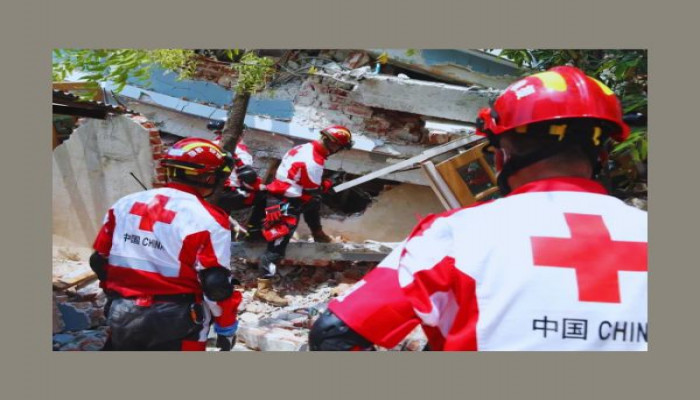Myanmar junta fires warning shots at Chinese Red Cross convoy
- In Reports
- 10:04 PM, Apr 02, 2025
- Myind Staff
Myanmar’s ruling military junta admitted on Wednesday that its forces fired warning shots at a Chinese Red Cross convoy delivering aid to earthquake survivors. The incident highlights the immense difficulties of humanitarian operations in a country torn by civil war. Aid organisations have been urging the junta to ensure safe and unrestricted access to affected regions.
Why It Happened
According to junta spokesperson Zaw Min Tun, the Chinese Red Cross had not informed authorities that it was entering a conflict zone on Tuesday night. When the convoy, which included local vehicles, failed to stop, security forces fired shots into the air as a warning. Despite this, a spokesperson for China’s foreign ministry confirmed that the aid team and supplies remained unharmed. “It’s necessary to keep transportation routes for relief efforts open and unobstructed,” said Guo Jiakun during a press conference.
Rising Death Toll and Affected Areas
The warning shots came as Myanmar’s death toll from last Friday’s 7.7-magnitude earthquake climbed to 2,886, with 4,639 injured. Hardest hit was the rural Sagaing region, much of which remains under the control of armed resistance groups fighting the military government. The International Crisis Group (ICG) warned that these areas will be among the most difficult for aid agencies to reach due to ongoing conflicts, local governance complexities and restrictions imposed by the junta.
Even before the disaster, the military had blocked access to vital information in these regions by shutting down the internet and mobile networks. “Soldiers are everywhere in the town,” a resident of Sagaing told Reuters. “They are there for security, not for rescue. They check every vehicle.”
International Calls for Unhindered Humanitarian Access
New York-based Human Rights Watch has demanded that the junta allow unrestricted access for humanitarian organisations. “Myanmar’s junta cannot be trusted to respond to a disaster of this scale,” said Bryony Lau, deputy Asia director at Human Rights Watch. The organisation called on international donors to bypass the junta and work directly with independent aid groups.
Rebel forces have accused the military of continuing airstrikes even after the earthquake. However, on Tuesday, a major rebel alliance declared a unilateral ceasefire to facilitate relief efforts. Meanwhile, the United Nations reported that more than 28 million people live in the six affected regions. The UN has allocated $12 million in emergency funds to support food, shelter, sanitation, mental health care, and other services.
Global Assistance and Local Struggles
Australia announced an additional A$6.5 million ($4.1 million) in humanitarian aid for Myanmar, emphasising that the funds would be delivered through “thoroughly vetted international and local partners.” Australian Foreign Minister Penny Wong reiterated that the country takes “proactive steps to ensure our assistance does not legitimise the military regime in Myanmar.”
Meanwhile, in Mandalay, near the earthquake's epicenter, residents reported authorities prioritising preparations for the upcoming Thingyan water festival, despite many people being left homeless. “Bodies are still under collapsed buildings, but they are building a festival stage,” one resident said.
Restrictions on Media and Developments in Thailand
The military council has refused requests from international journalists to cover the earthquake’s devastation, citing a lack of essential resources such as water, electricity and accommodations.
The earthquake also caused destruction in neighboring Thailand, where the death toll rose to 22 on Wednesday. In Bangkok, rescue teams continued their search for survivors under the rubble of a collapsed skyscraper under construction. The disaster left 15 dead and 72 missing. Early investigations revealed that some steel materials used in the building were substandard, prompting a government inquiry.
Myanmar’s deepening crisis, compounded by civil war and natural disaster, has made aid delivery nearly impossible in some regions. International organisations continue to push for unrestricted access to affected areas, but the junta remains firm in its control. The warning shots fired at the Chinese Red Cross convoy further underscore the challenges of providing humanitarian relief in a country engulfed in conflict.







Comments